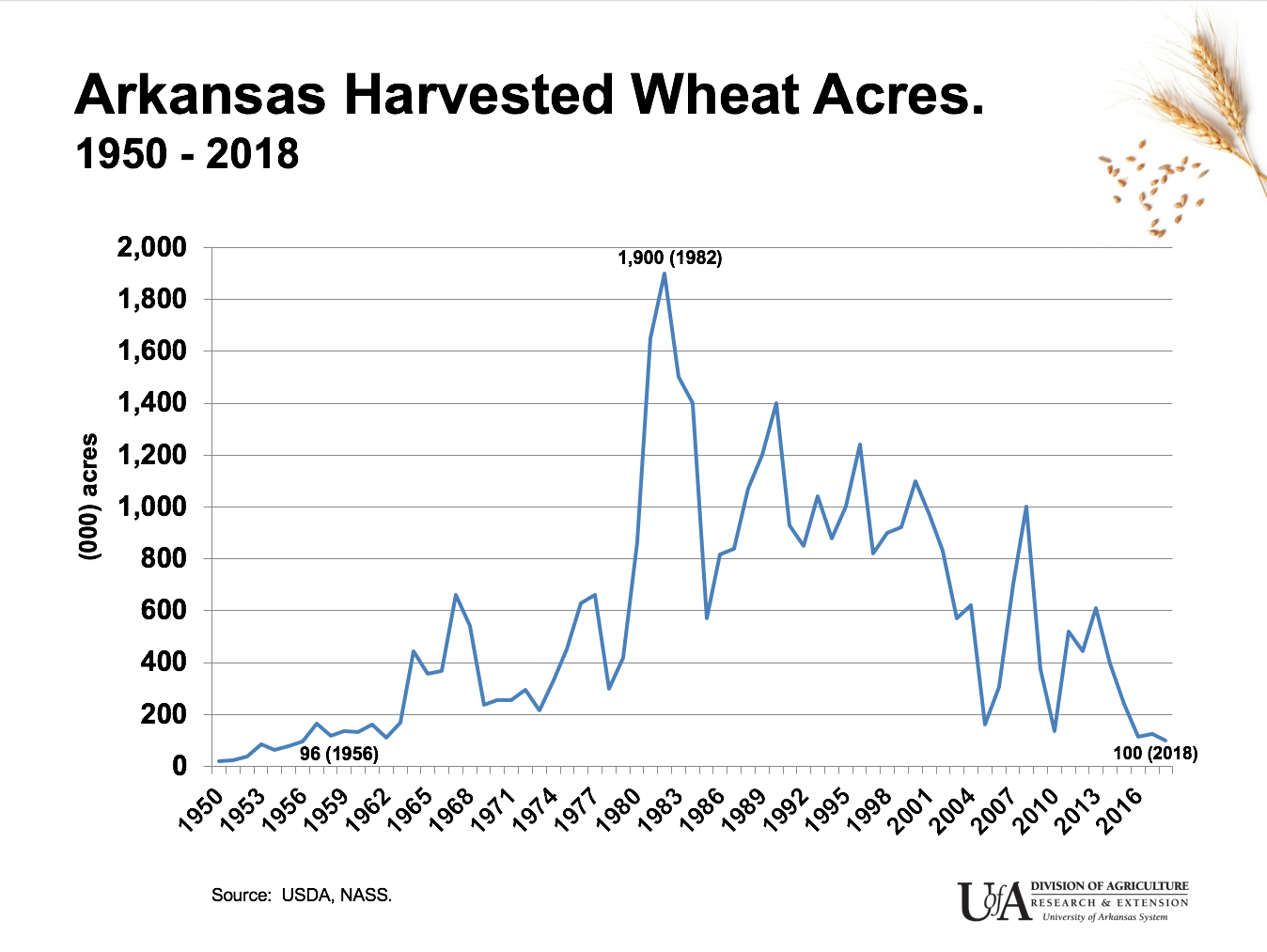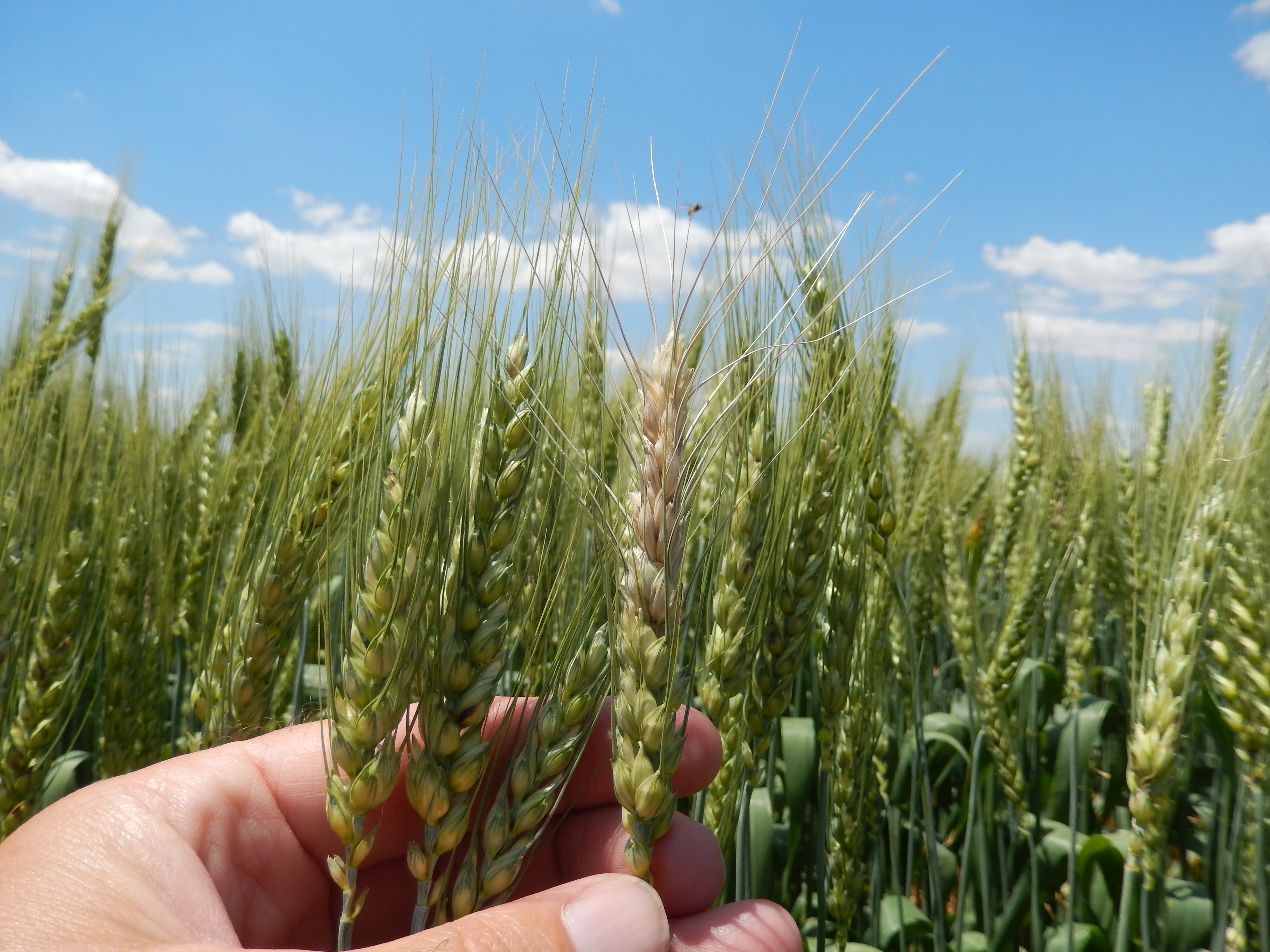Summertime price rise, weather threats elsewhere, sagging soy prices may boost Arkansas winter wheat acres

Sept. 20, 2018
By Mary Hightower
U of A System Division of Agriculture
Fast facts:
- Winter wheat harvested acres at 100,000
- Wheat contract prices saw bump up during summer
- Planning budgets for winter wheat growers: https://www.uaex.uada.edu/farm-ranch/economics-marketing/farm-planning/budgets/crop-budgets.aspx
(430 words)
(Newsrooms - With graphs here: https://flic.kr/s/aHsmiPNnfA )
Download Word version
JONESBORO, Ark. – Higher contract prices may add winter wheat acres in Arkansas, for which harvested acres had dropped its lowest level in six decades.

According to the National Agricultural Statistics Service, Arkansas farmers harvested 100,000 acres in 2018, the lowest number since 1956.
Jason Kelley, extension wheat and feed grains agronomist for the Division of Agriculture said on Tuesday. “This was partially due to prices, but a bigger factor may have been the dry fall which prevented some from planting. With the relatively low prices for soybeans and still somewhat attractive wheat price, wheat acres will likely increase this fall.”
Autumn is the time when Arkansas’ winter wheat growers are making planting decisions for a crop to be harvested next June. Each year, extension economists create planning budgets to help growers plan for each crop. The winter wheat enterprise budgets were released in August.
(See: https://www.uaex.uada.edu/farm-ranch/economics-marketing/farm-planning/budgets/crop-budgets.aspx)
“In doing our input cost surveys for the budgets, we did find that fertilizer costs had increased over the past year, and fertilizer is the single largest input cost for wheat,” said Scott Stiles, extension economist for the University of Arkansas System Division of Agriculture.
“Our budgets reflect a $22-per-acre increase in fertilizer costs over last year, but that number has now moved higher,” he said. “Prices for urea, phosphates and potash have continued to increase over the past month. In August, total variable costs in our wheat budget was projected to be up roughly $22 per acre from last year.”
Stiles said that wheat futures will need to recover to the $6 a bushel price level to compensate for the continued rise in fertilizer costs.
“On Wednesday, the July 2019 wheat futures contract was trading at $5.56, he said. “The July contract is 13 percent higher or 62 cents above where it was at this time last year.”
Kelley said he hoped that “when wheat hit $6 per bushel earlier this summer that some producers were able to take advantage and book wheat for June and July of 2019.”
As always in agriculture, weather is a concern “in some of the key global wheat production areas,” Stiles said. “A price recovery may occur over the coming months if the rest of the world has to rely more on the U.S. for wheat imports.”
The trouble spots around the world are Australia, Canada and the European Union.
“Australian production is off due to the terrible drought conditions,” he said. “To compound that, this week parts of Australia have also experienced frost and freezing temperatures. Estimates of their wheat production may be revised lower in upcoming USDA reports.”
For more information about enterprise budgets or row crop production, contact your county extension office or visit www.uaex.uada.edu.
About the Division of Agriculture
The University of Arkansas System Division of Agriculture’s mission is to strengthen agriculture, communities, and families by connecting trusted research to the adoption of best practices. Through the Agricultural Experiment Station and the Cooperative Extension Service, the Division of Agriculture conducts research and extension work within the nation’s historic land grant education system.
The Division of Agriculture is one of 20 entities within the University of Arkansas System. It has offices in all 75 counties in Arkansas and faculty on five system campuses.
Pursuant to 7 CFR § 15.3, the University of Arkansas System Division of Agriculture offers all its Extension and Research programs and services (including employment) without regard to race, color, sex, national origin, religion, age, disability, marital or veteran status, genetic information, sexual preference, pregnancy or any other legally protected status, and is an equal opportunity institution.
# # #
Media Contact: Mary Hightower
Dir. of Communication Services
U of A Division of Agriculture
Cooperative Extension Service
(501) 671-2126
mhightower@uada.edu